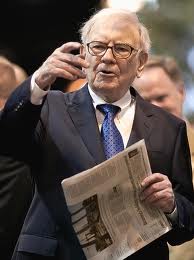
Is yesterday’s news tomorrow’s profits?
At this time each year, we look forward to the release of Warren Buffett’s missive to his Berkshire Hathaway shareholders. Most interesting to me is this year’s discussion about Newspapers. It is interesting because there was a time, not that long ago, when Warren Buffett had said he would not buy a newspaper at any price. As you read this year’s Letter, you quickly discover Warren Buffett can quickly change his view…
It may interest you to know that during the past fifteen months, he and Charlie acquired 28 daily newspapers at a cost of $344 million.
His words about the value in local news are also timely for Australia as Regional MPs raise concerns with Julia Gillard about the dumping of so called ‘reach-rules’ for TV broadcasting by Communications Minister Stephen Conroy in December.
Two important insights are: “Newspapers continue to reign supreme, however, in the delivery of local news. If you want to know what’s going on in your town – whether the news is about the mayor or taxes or high school football – there is no substitute for a local newspaper that is doing its job. A reader’s eyes may glaze over after they take in a couple of paragraphs about Canadian tariffs or political developments in Pakistan; a story about the reader himself or his neighbors will be read to the end. Wherever there is a pervasive sense of community, a paper that serves the special informational needs of that community will remain indispensable to a significant portion of its residents.”
and,
“Charlie and I believe that papers delivering comprehensive and reliable information to tightly-bound communities and having a sensible Internet strategy will remain viable for a long time. We do not believe that success will come from cutting either the news content or frequency of publication. Indeed, skimpy news coverage will almost certainly lead to skimpy readership. And the less-than-daily publication that is now being tried in some large towns or cities – while it may improve profits in the short term – seems certain to diminish the papers’ relevance over time. Our goal is to keep our papers loaded with content of interest to our readers and to be paid appropriately by those who find us useful, whether the product they view is in their hands or on the Internet.”
Excerpt from the 2012 Berkshire Hathaway Letter.
I read that too Roger and it made me wonder about Fairfax stopping the weekday print editions. they may save $500m but it could be a disastrous strategic call.
The buying of these 28 daily newspapers is a backward step and just might be the downfall of Warren and Charlie, i now wonder how computer literate they are, surely society over time will not revert back from online to print.
“the snowball” does paint a good picture of warren and technology. I think they are on top of it and got a decent deal from memory. They do talk about the need for a sensible Internet strategy.
I do agree with their thoughts on the strengths of locals and how it is less affected by structural changes that the mass market papers are seeing. Time will tell, I don’t think they will make a huge return on it but it will be profitable for them.
Roger,
Firstly, as an investor in the Montgomery fund, I hope to look back in 30 years, and see a first page on performance as Berkshires, possible?
To the question, Buffet splits his portfolio primarily into four categories,
Insurance, Regulated Capital Intensive, Manufacturing Service and Retailing, Finance and financial products.
Reconciling your thesis, fund mandate which is concentrated around the Australian Market, the question regards the sector he describes as Regulated Capital Intensive, which holds utilities and railroads.
What is your view of these capital instensive businesses (particuliar achieving ROE>15%, low debt, rising IV), and how they reconcile with yours, that is capital intensive is not preffered.
Also, Skaffold rates almost all Australian utlities sub investment grade.
Out of curiosity, do you see your funds ever acquiring and holding examples of these business for the long term, whats the closest example you see in the market today, and whats your view that Buffet is taking on the bet for renewables with his exposure to Mid American. Lots of questions on how the Oracle thinks.
Thank you for the education, and the service that you offer.
On page 18 of the letter there are two sentences that suggest the prices for these newspapers have become cheap enough that even the forecast lower returns will be enough to make them profitable investments – or at least achieve their hurdle rate. The prices might have changed substantially since they said they wouldn’t at “any price”.
The other thing that stood out for me was the $2.8B of earnings retained by Amex, Wells Fargo, IBM, and Coke, which WB – quite rightly – attributes to Berkshire. There must be close to $2B of “unreported” earnings from their other share holdings also.